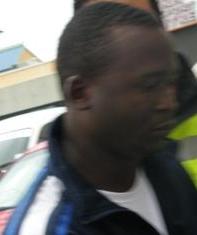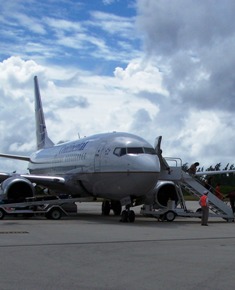Archive for November 21st, 2010
Mosquito boss says GM project is safe
(CNS): The release of genetically modified mosquitoes in Grand Cayman poses no threat to people, says the director of the MRCU. A project that is seeking to suppress the stinging dengue carrying pest using male insects which have been genetically altered to be infertile has reduced the mosquito population without using chemicals. The trial has attracted considerable attention because the details of the release seemed to have stayed under the radar. Government did produce a short documentary segment about the project in which the MRCU partnered with the UK firm Oxitec Limited but little information has been circulated in the public domain. Dr Bill Petrie has said people have noting to fear from the trial.
“The males that we release don’t live very long,” he explained to Cayman 27 on Friday. “They don’t persist in the environment so the trans-gene that they possess doesn’t persist in the environment.”
The “mutant mozzies”, as they have been dubbed in some quarters, have attracted worldwide attention and were the first of their kind to ever be released into the wild. Three million of the sterile male mosquitoes, which cannot bite, were released into the local population on the eastern end of the island to mate with females, preventing them from reproducing.
Between May and October scientists released batches of the mosquitoes in cages three times a week in a 16-hectare area. By August, mosquito numbers had fallen by 80 percent, compared with a neighbouring area where no sterile male mosquitoes were released.
In a segment for GIS earlier this year Petrie explained the project was about fighting dengue, for which there is no vaccine or cure and it is on the increase. The mosquito aedes aegyptti associated with the virus populates Grand Cayman but does not carry dengue here. As this mosquito tends to congregate around populated areas scientists are trying to find non-chemical ways of dealing with the dangerous pest. “Any tool we can use against this mosquito would be useful,” he said.
Angela Harris of the MRCU said the technology had gone through years of development in the laboratory and Cayman was at the cutting edge of science by being the first place to test the genetically modified mosquitoes, which should prevent females from reproducing. When females mate with the ‘mutant mozzies’ the resulting larvae always die before hatching.
With this first trial already revealing promising results reducing the levels of the aedes aegypti by an impressive 80 per cent, compared with the untreated site next door, the ‘mutant mozzie’ will now be released where the female mosquito is carrying dengue fever.
Oxitec, which is a spin-out company from Oxford University, is set to carry out five more similar trials around the world over thenext year. It had hoped to launch its first dengue fever field trial in Malaysia, but was held up by regulatory problems and criticism from some anti-GM campaigners. Oxitec now hopes the Malaysian trial will start later this month. The delay enabled the Cayman Islands, where aedes aegypti mosquitoes arrived in 2002, to get in first.
Oxitec insists that its GM mosquitoes are environmentally benign and represent the only hope of rolling back the global advance of dengue-infected mosquitoes. Aedes aegypti are an alien species spread by human activity so their eradication would not disrupt local ecosystems.

Murderers in court of appeal
 (CNS): The two men convicted of murdering local activist Estella Scott-Roberts will return to the courtroom Monday morning. The Cayman Islands Court of Appeal is set to hear from lawyers representing Kirkland Henry and Larry Ricketts why they believe the convictions should be quashed. The grounds of appeal have not yet been revealed for the two men, whose cases will be heard separately. Both men were found guilty of the murder of the Cable & Wireless executive after a judge alone trial before the chief justice in February. Henry had pleaded guilty to kidnapping, robbery and rape but not guilty to murder, accusing his co-defendant Ricketts of the killing. Ricketts pleaded not guilty to all charges, insisting he was not there on 11 October 2008 when Scott-Roberts was murdered.
(CNS): The two men convicted of murdering local activist Estella Scott-Roberts will return to the courtroom Monday morning. The Cayman Islands Court of Appeal is set to hear from lawyers representing Kirkland Henry and Larry Ricketts why they believe the convictions should be quashed. The grounds of appeal have not yet been revealed for the two men, whose cases will be heard separately. Both men were found guilty of the murder of the Cable & Wireless executive after a judge alone trial before the chief justice in February. Henry had pleaded guilty to kidnapping, robbery and rape but not guilty to murder, accusing his co-defendant Ricketts of the killing. Ricketts pleaded not guilty to all charges, insisting he was not there on 11 October 2008 when Scott-Roberts was murdered.
Ricketts had, however, made a confession to the police soon after his arrest and the chief justice said in his verdict that he was no doubt that Ricketts’ confession had been made freely and had not been concocted by the police as Ricketts had claimed when he took the stand. The judge also rejected Henry’s claim that while he was at the scene of the crime he had not participated in the murder and had told Ricketts he wanted no part in killing their victim. “I do not accept he made any attempt to withdraw from the criminal enterprise,” the chief justice stated before he indicated he was satisfied that Henry was also guilty of murder.
The badly burned body of Estella Scoot-Roberts was discovered in her own burnt out car in the Barkers area of West Bay on Saturday, 11 October 2008. She was last seen alive on the night before, when shehad dinner with friends at Deckers restaurant on the West Bay Road. The two men had abducted her from the parking lot at around 1pm that night.
Both men, who are Jamaican nationals, are serving life sentences at HMP Northward. At the time of their arrest in 2008 the men were living in George Town, where Ricketts worked as a carpenter and Henry a gardener.
Although both men were tried for the murder and Henry pleaded guilty to three other charges, Ricketts is still listed to face trial for abduction and robbery. This case was set for October but the trial was postponed until after the appeal.
Alongside his life sentence, Henry also received 20 years for rape, 15 years for abduction and 13 years for robbery and he is also appealing those sentences.

Kids asked to depict human rights through lens
 (CNS): With Human Rights Day celebrations only a few weeks away young people aged between 8 and17 years have the chance to compete in a photo competition depicting human rights. The CI – See You competition is inviting original images taken in the Cayman Islands by young people which will be judged in three age groups: eight to 11 years, 12 to 14 years, and 15 to 17 years. The photos will be judged on creativity, and how well they show the messages of human rights, freedom and social responsibility. All children’s human rights include their right to freedom, family, religion, education, nutrition and health. There will be an overall best photo winner, as well as two honourable mentions in each age group.
(CNS): With Human Rights Day celebrations only a few weeks away young people aged between 8 and17 years have the chance to compete in a photo competition depicting human rights. The CI – See You competition is inviting original images taken in the Cayman Islands by young people which will be judged in three age groups: eight to 11 years, 12 to 14 years, and 15 to 17 years. The photos will be judged on creativity, and how well they show the messages of human rights, freedom and social responsibility. All children’s human rights include their right to freedom, family, religion, education, nutrition and health. There will be an overall best photo winner, as well as two honourable mentions in each age group.
Only one entry per competitor is allowed and the prizes will be awarded on Friday, 10 December at the Human Rights Music and Arts Show at Camana Bay. Each overall best photo winner will receive a $50 gift certificate, and each honourable mention will receive a $25 gift certificate. The photographs will also be published in local media and displayed at locations throughout Cayman, as well as posted on the Human Rights Commission website.
The deadline for photo submissions is Friday, 3 December. Winners will be notified on Wednesday, 8 December. Each submission must include the photographer’s name, age, e-mail address and phone number, as well as the photo title, and a description of the subject area (such as human rights, freedoms or responsibilities). The digital photographs should be between 2MB and 3MB in size.
Photos can be submitted in three ways: e-mail them to debbie.bodden@gov.ky;
mail them to the Human Rights Commission, c/o Commissions Secretariat, P.O. Box 391, Grand Cayman KY1-1106; or
deliver them to the Human Rights Commission, c/o Commissions Secretariat, Smith Road Centre, 2nd Floor, George Town, Grand Cayman.
For more information contact Debbie Bodden on debbie.bodden@gov.ky or 244-3685.

Government bean counters review standards
 (CNS): As government accountants struggle to put together up-to-date management accounts that tell the people exactly how public money is being spent, 75 number crunchers from core government, statutory authorities and government companies attended a five-day intensive workshop recently. According to a release from government information services (GIS) the goal was to help government’s accountants and auditors better grasp new standards in financial management and reporting. Organised by the Civil Service College, the auditor general and accountant general, the workshop also raised a number of questions on how standards designed for large corporations applied to CIG operations.
(CNS): As government accountants struggle to put together up-to-date management accounts that tell the people exactly how public money is being spent, 75 number crunchers from core government, statutory authorities and government companies attended a five-day intensive workshop recently. According to a release from government information services (GIS) the goal was to help government’s accountants and auditors better grasp new standards in financial management and reporting. Organised by the Civil Service College, the auditor general and accountant general, the workshop also raised a number of questions on how standards designed for large corporations applied to CIG operations.
With accountants attending from key departments, such as the budget unit, treasury and the audit office, Audit Manager Martin Ruben from the AG’s office said government accountants in Cayman had to become familiar with the new international standards and their implications.
“Financial managers should understand, for instance, the way a school is financed and how this is to be reported under international accounting standards in order to provide good advice on the impact on government’s finances,” he noted. The workshop provided a timely opportunity to discuss common issues and the need for common practices, as well as to network, he added.
Workshop facilitator from the Wales Audit Office, Iolo Llewellyn, lauded government’s foresight in adopting international financial reporting and public sector accountancy standards – years ahead of the United Kingdom. However, while the standards may have been adopted the public has not yet seen them in action as government has not produce an audited annual financial report since 2004.
The workshop reportedly generated debate about applying the extensive standards developed primarily for large public corporations, as compared to government operations in the Cayman Islands, the Welsh Office representative said.
Senior Assistant Financial Secretary Anne Owens summed up the workshop’s usefulness when she described it as “very informative”, but said a lot of work was needed, as a group, “to apply the standards consistently.”
Government is currently in the process of attempting to address the ongoing backlog of incomplete public accounts, and money was allocated in the last budget to pay for external accounting support to get the government books up to date. The 30 September deadline set by the Legislative Assembly’s Public Accounts Committee has come and gone but the auditor general says he intends to publish an annual report in December revealing the current state of all government accounts.
Last month the AG admitted that, despite enormous pressure as well as the extra funding and personnel to get the 209/10 government accounts into the auditor general’s office by the statutory deadline of 31 August, more than half the chief financial officers in ministries and other government entities failed to make the deadline.

Corporate charter boosts Brac tourism
 (CNS): A Texas based corporation chose Cayman Brac this week as a destination to reward employees and their families with a short vacation break. The 79 visitors came to the Brac for their five day getaway via a Continental Airlines 737-700 charter flight direct from Houston which touched down at Gerrard-Smith International Airport on Cayman Brac on Wednesday 17 November Clint Davis, of Mesa Engineering and the group leader said Cayman Brac was an obvious choice for the firm because it was extremely accessible from Houston.
(CNS): A Texas based corporation chose Cayman Brac this week as a destination to reward employees and their families with a short vacation break. The 79 visitors came to the Brac for their five day getaway via a Continental Airlines 737-700 charter flight direct from Houston which touched down at Gerrard-Smith International Airport on Cayman Brac on Wednesday 17 November Clint Davis, of Mesa Engineering and the group leader said Cayman Brac was an obvious choice for the firm because it was extremely accessible from Houston.
“This trip was organized as a reward for my employees for the successful completion of a project at Mesa Engineering in Houston, Texas. The group comprises approximately 20 employees and their families as well as family members of those employees who could not join us as they are on assignment in other locations,” the company boss said.
During their stay the guests enjoyed island tours, fishing trips and rock climbing as well as some star gazing and bird watching. “We have an astronomer in the group and the bird watchers are having a great time with another member of our group, an Ornithologist from the University of Oklahoma, who has thus far documented 35 species of birds,” Davis added.
“The Brac is absolutely beautifuland the services on Island and at the Brac Reef Beach Resort are five-star. I would definitely recommend the island to other groups.”
Mesa Engineering has been in the engineering research and product development business for the past 35 years and its designs have been used in the systems for three space stations, as well as a host of other industries including the aero space, energy and medical fields.
Jeremy Jackson, CEO of the Cayman Islands Airports Authority, who was at the terminal for the arrival of the charter flight, said that he was extremely pleased to learn that Cayman Brac had been chosen by the group. “The Airports Authority and its team at Gerrard-Smith look forward to working with other airlines that are considering the Brac as a possible destination as it will continue to boost tourism for the Island which ultimately benefits the local economy,” he said.
“We would like to thank Mr. Phillip Ebanks, the station manager for Continental Airlines on Grand Cayman for travelling to the Brac to assist as necessary with the processing of their flight. We are also grateful to the Cayman Airways team who served as ground handlers and processed luggage and other aircraft requirements,” he remarked.
The Mesa Engineering group left Cayman Brac late on Sunday, 21 November on the return Continental Airlines charter flight.

Warren Buffett and trickle down
Warren Buffett is indeed a very rich man. Unlike most of his peers and most of those who spend their lives trying to attain wealth of a similar magnitude, he would appear to be, above all else, an honest human being.
At a time when the sentiments and actions of those who are positioned to inform, shape and fashion public opinion in the United States and far beyond appear unswervingly committed towards the entrenchment of policies that would serve to sustain and further widen income inequality (currently at levels not seen the 1920’s), a billionaire who is forthright enough to go on national TV and say, “I think that people at the high end, people like myself, should be paying a lot more taxes; we have it better than we’ve ever had it”, is indeed an honest human being.
When Mr Buffett was asked by the program hostess how he was able to reconcile his stated position with the conventional wisdom that the very wealthy needed tax cuts to spur business and capitalism, Mr Buffett responded, “The rich are always going to say that you know, just give us more money and we’ll go out and spend more and then it will trickle down to the rest of you. But that has not worked the last ten years and I hope the American public is catching on.”
It is not only the American public that needs to catch on to the colossal failure of the trickle down concept as a credible approach to sustainable economic development.
Here in the Cayman Islands, every elected official over the past three decades, regardless of group or party affiliation, every major opinion shaper, regardless of the economic sector he/she represents, has committed themselves to the shaping and promotion of policies that are rooted in the trickle down concept.
The reality on the ground suggests it is not a viable approach to the attainment of sustainable development for the “rest of us”.
Not unlike the United States, “the rest of us” here in the Cayman Islands would be naïve to believe that the entrenched power block is likely to exhibit the forthrightness and honesty of Mr Buffett any time soon.
As Mr. Buffett suggested, one would sincerely hope the Caymanian public is catching on.
New hospital charity begins long road to $8.7 million
(CNS): A new charitable foundation which intends to raise cash for much needed equipment and improvements for government hospitals has now been formally launched and has collected its first $35,000 — a very small step towards the almost $9million it hopes to eventually raise. The Caring for Life Foundation (CFLF) will be like similar foundations in Europe and North America, operating independently of the HSA and government and working as a charitable trust with a board of advisers assessing needs and expenditures, Bruce John, the founder of the trust said.At the official launch of the foundation last Wednesday week, John who is a Scotiabank Director cited a five-page list detailing $8.7 million in needed equipment and improvements.
He said the foundation would seek equipment, “for the medical, maternity and surgical wards, the operating theatre, accident and emergency, dialysis, pathology laboratory , the hospital’s plant and facilities, and the critical care unit, just to name a few”.
The CFLF will also work closely with the Cayman Islands Cancer Society, the Heart Fund and the Kidney Foundation to raise money for equipment, enabling them to perhaps “focus their attention on education, research and assisting” patients who can’t afford treatment. “Many of the best hospitals in North America and Europe became world-class medical centres through donations made by the public to foundations established to invest in their health care,” John said.
The HSA’s Chief Executive, Lizette Yearwood said she was thrilled about the creation of the foundation and welcomed John’s efforts. “This is a tremendous boost to our efforts, the work of the HSA and, in fact, the entire healthcare industry in the Cayman Islands,” she said. “The foundation will provide enormous and much-needed support for the health and well-being of the population and will help us to keep pace with developments locally and internationally.”
The health minister has also thanked John, saying the efforts of the CFLF would contribute to the well-being of everyone in the Cayman Islands, and greatly assist the HSA in procuring much-needed equipment and possibly even building improvements. “It is very difficult for the HSA, given its mandate, to procure new equipment and building improvements, particularly during these difficult financial times’” Scotland said at last week’s launch. “This is truly a gift to all the people of the Cayman Islands, and we are deeply grateful for the efforts of Mr John, his board of advisers and the dedicated group of concerned individuals who worked so hard in the last three years to make this possible,” Mark Scotland said.
The Governor of the Cayman Islands Duncan Taylor gave his blessing to the foundation at a ceremony at Government House where John thanked the Foster family, Walker’s Attorneys-at-Law, the Pink Ladies and Scotiabank organisations for pledging the first $35,000 that evening.
The bank, he said, had allocated additional money for an annual golf tournament, to be inaugurated on 26 November at the North Sound Golf Club with initial sponsorship from Princess World Jewelers. All monies raised will be donatedto the CFLF.
“We have a dedicated, caring and talented group of professionals and staff in our public hospitals, and the CEO and the Board of the HSA have made significant progress in improving the quality of care over the last few years, but they are in need of our help,” he said.